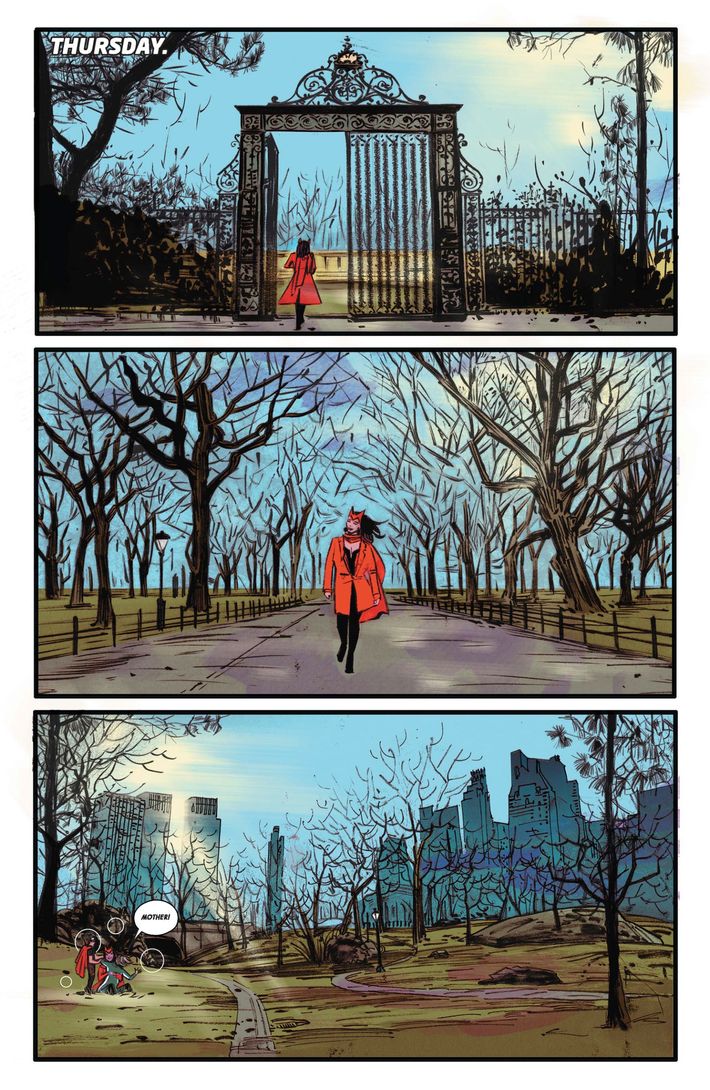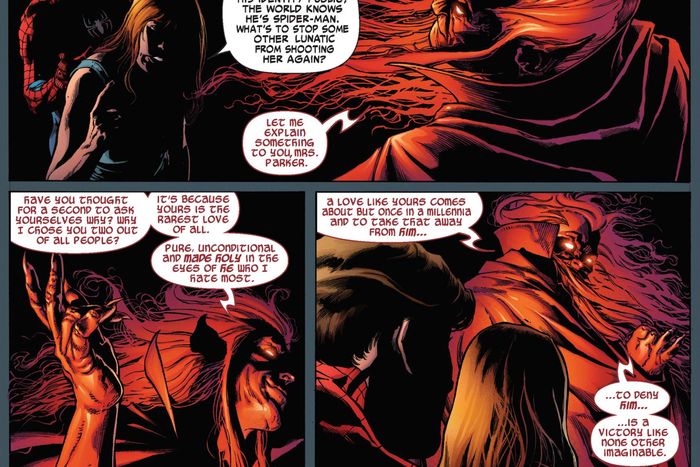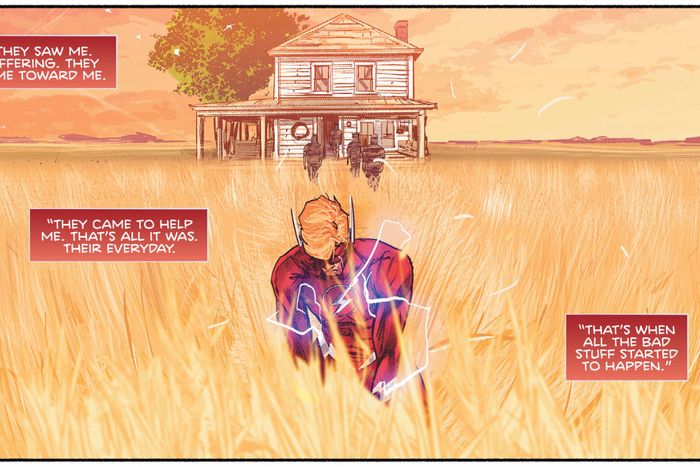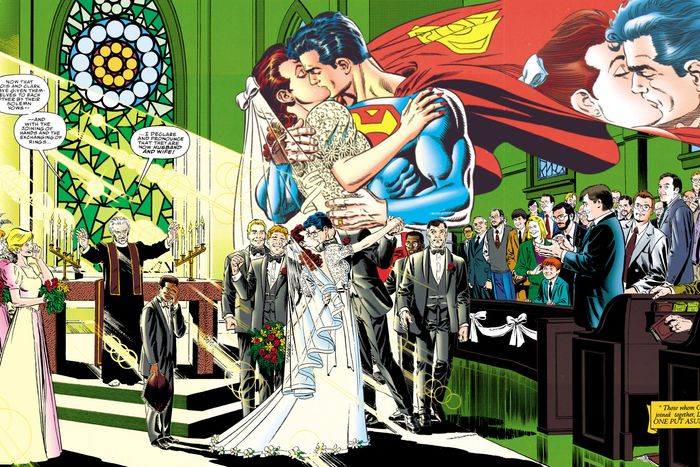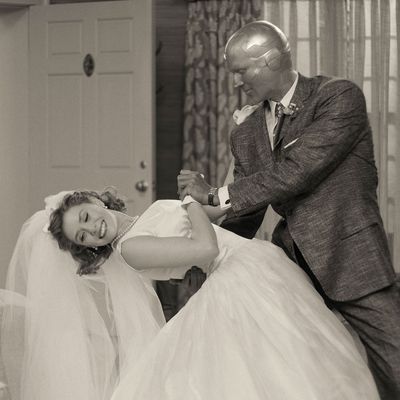
Two words are a greater threat to superheroes than any villain: “I do.”
Superhero marriages don’t end in divorce. They end in insanity, violent death, or getting erased from the timeline so the marriage never happened at all. Marvel Studios’ WandaVision is bringing the messiness of superhero marriage to the masses, and it’s throwing viewers for a loop with its reality-warping storyline wrapped in ever-shifting sitcom aesthetics. Wanda and Vision’s comic-book history is even wilder, and their doomed marriage is just one of many in a genre that all too often sees matrimony as a dead end for characters rather than the start of a new journey.
The most severely injured parties in these situations tend to be the wives, which is indicative of a deeper superhero problem regarding the treatment of women. Writer Gail Simone’s late-’90s website Women in Refrigerators assembled a list of women who had been “killed, raped, depowered, crippled, turned evil, maimed, tortured, contracted a disease, or had other life-derailing tragedies,” and almost every superhero wife is on there. The Women in Refrigerators list is years out of date, and there are plenty of additions. The mid-’00s were a particularly cruel time for superhero wives, and the industry thrived on their suffering in event comics like Avengers: Disassembled and Identity Crisis. When Marvel decided to launch a new team of the Avengers that would bring superstar characters like Spider-Man and Wolverine onto the team, writer Brian Michael Bendis and artist David Finch turned to Wanda Maximoff to end the previous era. Driven to madness by the loss of her children, Wanda wreaks havoc on her former teammates in 2004’s Avengers: Disassembled, and in 2005’s House Of M, Wanda’s brother convinces her to rewrite all of reality so she can have her children again.
There have been retcons that diminish Wanda’s responsibility in these acts, like 2009’s Avengers: The Children’s Crusade, which brings her back after an extended absence and immediately throws her into an engagement with Dr. Doom. The problem with all of these stories is that the conventions of the genre prevent creators from engaging with Wanda’s trauma in a way that goes beyond using it as fuel for big superhero showdowns. There are very few comics that delve into Wanda’s pain in an emotionally substantial way. When they do, as in 2016’s Scarlet Witch #8 by writer James Robinson and artist Tula Lotay, they reveal a complex web of relationships that are shaped by fantastic circumstances but provide ample metaphors for abandonment, grief, and the challenges of creating the perfect reality for yourself and your family.
The Avengers have a particularly disastrous comics track record when it comes to members getting married. Ant-Man and the Wasp are the team’s first marriage, which ends when Hank Pym has a mental breakdown and hits his wife when she tries to prevent him from launching an attack on the Avengers. Hawkeye and Mockingbird get married and become founding members of the West Coast Avengers, but then Mockingbird is abducted, mind-wiped, and coerced into a romantic relationship with a supervillain. Hawkeye can’t forgive her when she lets her abuser fall to his death, and shortly after, Mockingbird herself dies. Bruce Banner and Betty Ross’s marriage lasts just over a decade, but then she dies from radiation poisoning. Both Mockingbird and Betty are revived because death is rarely permanent in superhero comics, but that doesn’t change the fact that these stories have repeated sacrificed the wife in order to remove the shackles of marriage.
Three years after becoming an official member of the Avengers, Spider-Man gets hit with this curse in 2007’s controversial “One More Day” storyline. Written by J. Michael Straczynski with art by Joe Quesada, “One More Day” has Peter and Mary Jane Parker make a literal deal with the devil to save the life of Aunt May, who was shot during the Civil War event. Responsible for the loss of Wanda’s children and the death of Mockingbird, the demon Mephisto has been an active player in tormenting married heroes, and he agrees to save May’s life in exchange for the Parker marriage, a love so rare that taking it away is a direct blow to God. Marvel editorial was convinced that Peter’s marriage was alienating him from readers, and with the success of the Spider-Man films, the publisher wanted to give Peter Parker a fresh start that would ideally restore his popularity. And it worked. “One More Day” was critically panned because it is so damn stupid, but it was a huge commercial success, Peter and Mary Jane still aren’t married, and Amazing Spider-Man is consistently one of Marvel’s best-selling series.
Marvel isn’t the only superhero publisher afraid of marriage. Written by best-selling novelist Brad Meltzer with art by Rags Morales, 2004’s Identity Crisis is a DC Comics murder mystery that starts with the murder of Elongated Man’s wife, Sue Dibny. On the same page where he cradles her charred body, a panel in the corner shows a positive pregnancy test. It’s an especially egregious fridging, destroying one of the few positive, lasting marriages in superhero comics for a moment of shock and awe that is only a precursor to deeper disrespect. Identity Crisis hyped up a shocking reveal from the Justice League’s past, which is that Sue Dibny was raped by Dr. Light, a joke villain who is now a serious threat because he commits sexual violence against a woman. And the mastermind behind all of this? Jean Loring, the Atom’s ex-wife, who hopes that hurting people close to superheroes will send her ex-husband running back to her.
The spectre of Identity Crisis looms large on Heroes In Crisis, the 2018 series from writer Tom King and artists Clay Mann, Mitch Gerads, and Travis Moore. Wally West, the main Flash from the late ’80s to the late ’00s, had a wife and two kids when DC decided to relaunch its entire superhero universe in 2011’s New 52 initiative. Wally, Linda, Jai, and Iris West were all erased, but Wally would return as a harbinger of hope in 2015’s DC Rebirth. A few years later, Heroes In Crisis pulls a 180 on the character and makes him a mass murderer at a superhero trauma center.
In more recent superhero history, King has been dragging married heroes through the mud in books like Heroes in Crisis, The Vision, Mister Miracle, and the current Strange Adventures. The Vision, featuring art by Gabriel Hernandez Walta and Michael Walsh, is direct source material for WandaVision, taking the synthezoid to the suburbs with the perfect nuclear family created in his own image (with a little Wanda sprinkled in). Except things aren’t so perfect, and it doesn’t take long for it all to come crashing down as the spouses’ secrets come back to haunt them.
Mister Miracle, drawn by Gerads, is a rare superhero comic that actually affirms a marriage, but it puts Scott Free and Big Barda through the wringer on the way to their happy-ish ending. The jury’s still out on whether Adam and Alanna Strange will make it through Strange Adventures, reuniting King with Gerads for the characters’ present-day struggles while artist Evan Shaner draws flashbacks. But that book already has one grieving, formerly married hero in widower Mr. Terrific, the rare superhero with a tragic marriage built into his origin: After losing his wife and unborn child in a car accident, atheist Michael Holt is visited by the Spectre, the spirit of God’s vengeance, and inspired to fight crime by taking on the name of a Golden Age superhero.
There are some exceptions when it comes to superhero marriages, the biggest ones being Reed Richards and Sue Storm of the Fantastic Four and Clark Kent and Lois Lane. Reed and Sue’s marriage has even made it to the big screen, albeit in a movie that effectively killed that iteration of the franchise. Lois and Clark are currently together with an adult son in the comics, but the aforementioned New 52 also erased Lois and Clark’s marriage, sending Superman off into a romantic relationship with Wonder Woman instead. The publisher eventually realized the narrative value of the Superman family and brought back the previous iteration of these characters, now refugees of a dead universe making a new life for themselves and their son.
The super-marriage has made its way off the page, too, but solely on television. ABC’s The Adventures of Lois and Clark had its title characters marry at the same time as their comic-book counterparts, and The CW’s new Superman and Lois gives the married couple teenage twin sons. It makes sense for this status quo to thrive on The CW, which has the family soap opera form built into its DNA. It’s also worked for Black Lightning, which premiered its fourth and final season this week. Jefferson Pierce and Lynn Stewart are divorced in the series, but they maintain a strong connection, not just because they share custody of their two daughters, but because they genuinely care about each other. Black Lightning is built on a long-term superhero romance and how it changes over time, inevitably falling apart but rebuilding into something different. Maybe even something better.
If TV has given other superhero couples the opportunity to grow and discover each other in meaningful ways over time, maybe Wanda and Vision could make it work in WandaVision. Maybe it could happen in a cheerful domestic sitcom where the expectation is that every problem is wrapped up in a neat bow by the end of the episode. But WandaVision isn’t a sitcom. It’s a major new chapter in the MCU’s larger superhero narrative, which hasn’t been kind to its married heroes.
The MCU’s first superhero marriage, the original Ant-Man and the Wasp, is put on a decades-long pause when the Wasp gets trapped in the quantum realm. Tony Stark and Pepper Potts get married and have a daughter, and then he dies. Hawkeye has a genuinely happy home life with a wife and kids, and his entire family gets snapped away. Superhero marriage typically leads to devastating trauma, so the idea that Wanda and Vision could have a perfect, low-stakes sitcom marriage is antithetical to the genre that originated them. The second Wanda magics wedding rings for herself and her new synthezoid husband, she links them to a legacy of stories that will do anything to end marital bliss.


